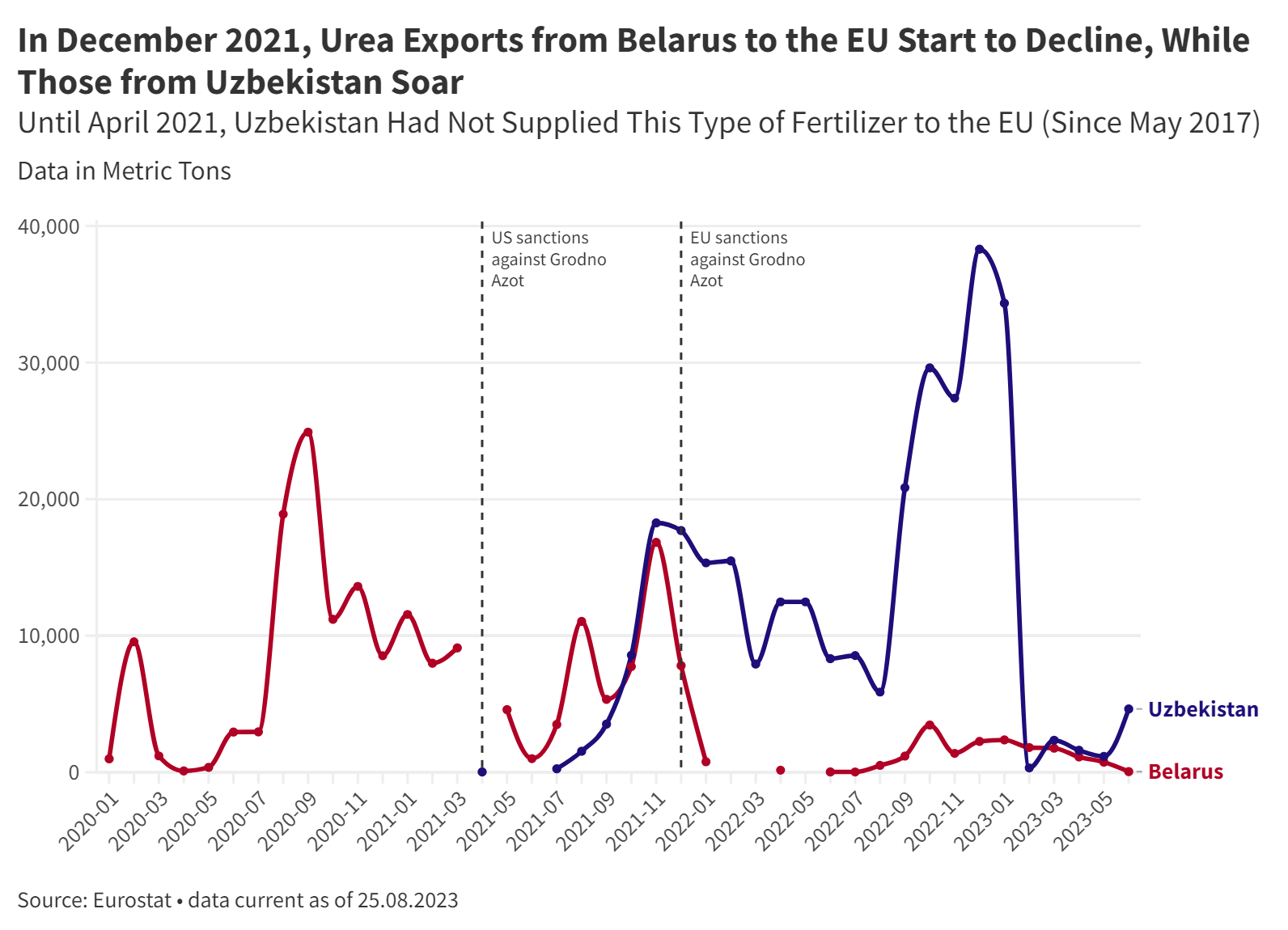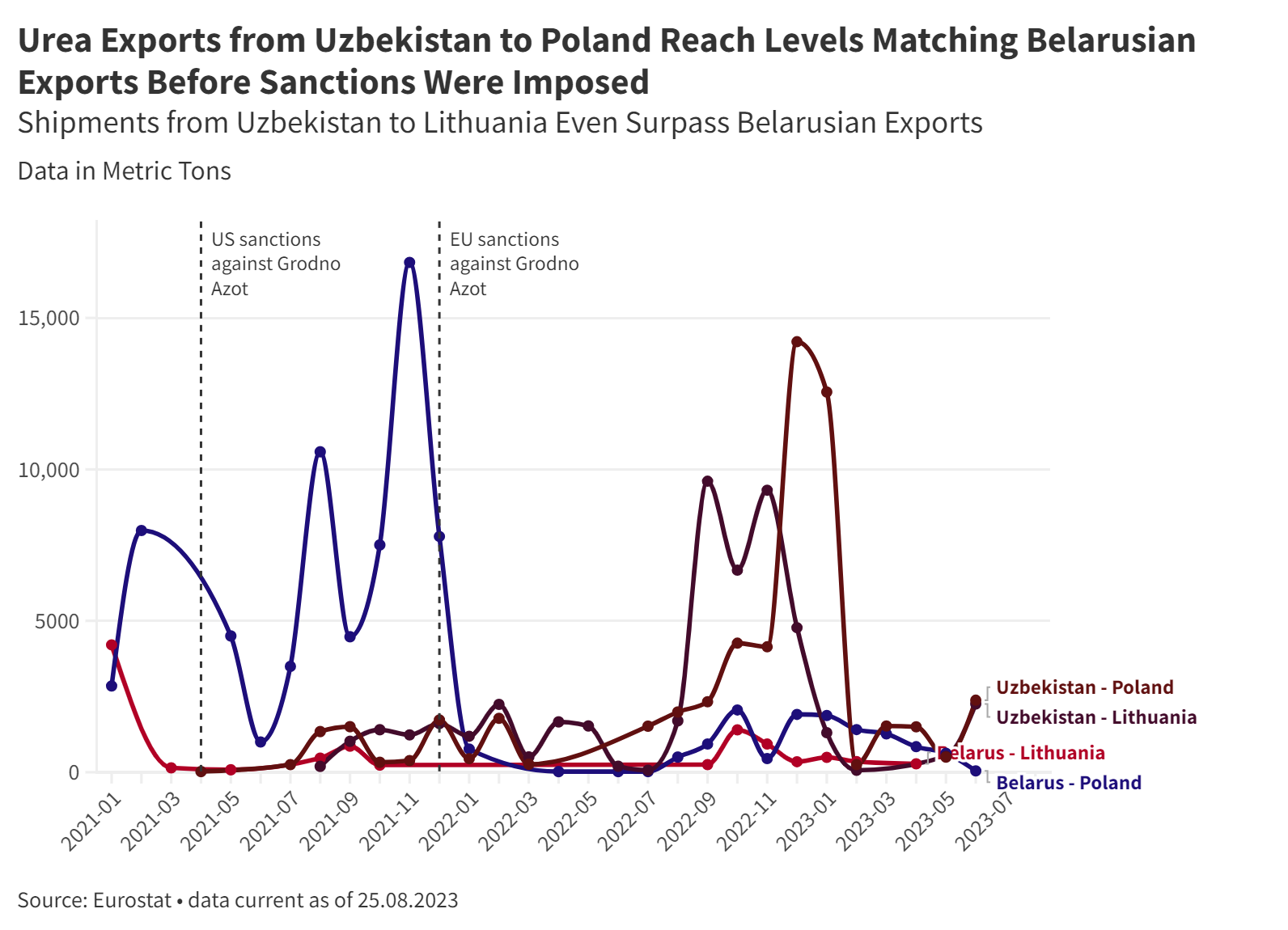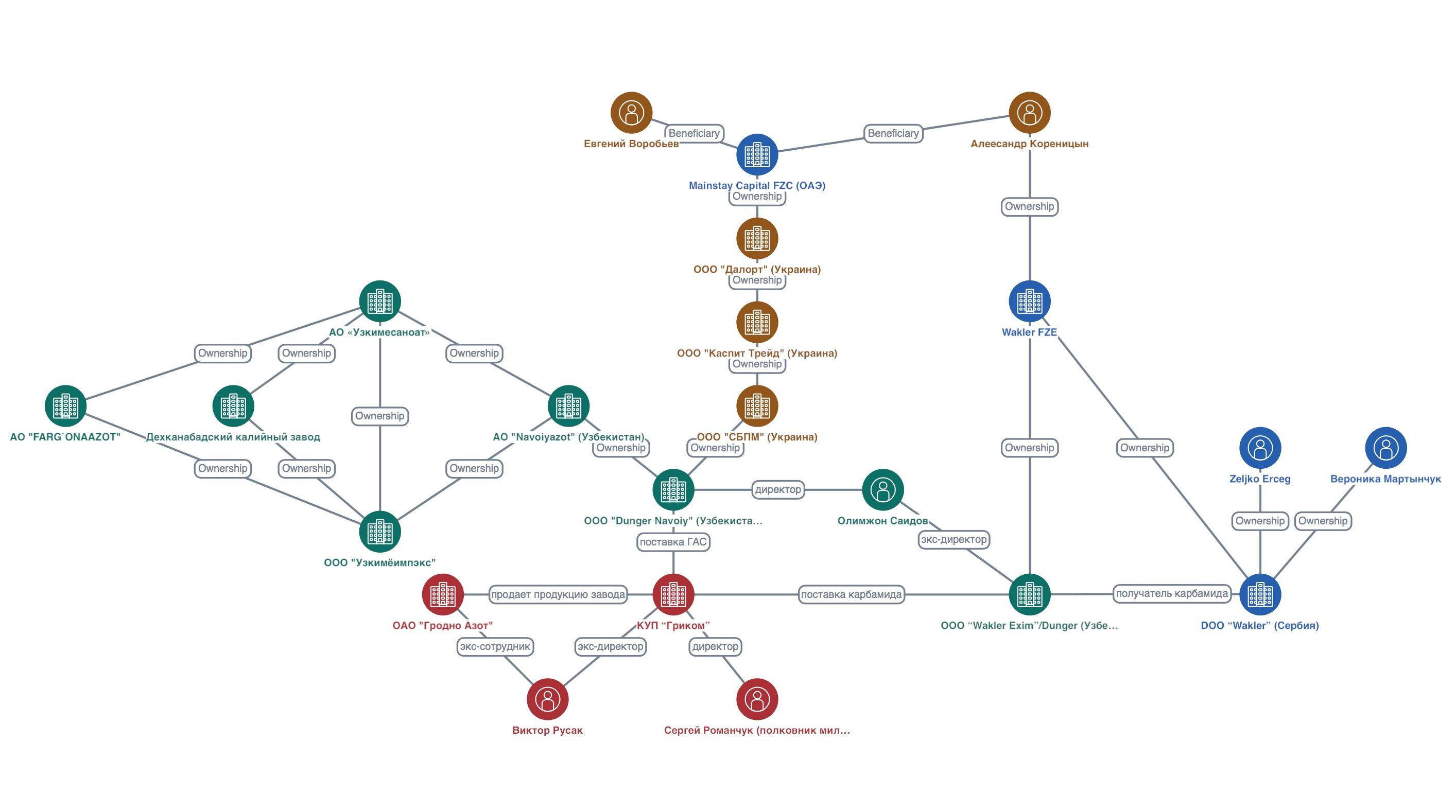Nitrogen fertilisers from the potash plant
Other companies that purchase prohibited goods from Belarus do much worse at hiding their origin. The BIC has exposed another smuggling export scheme.
A load of Uzbek urea was purchased by the Lithuanian company Milca Baltija. Its owner is 23-year-old Belarusian Roman Semenenya. [*][*] In Belarus, Semenenya worked as the acting director of the Prommechanika Plant. [*] Prommechanika, which has been declared bankrupt, is infamous for employee grievances over unpaid salaries and production halts. Semenenya also has companies in Poland and Germany. [*][*][*]
The urea delivered to Milca Baltija came from the Uzbek state-owned Dekhkanabat potash plant, according to the customs declaration. But Dekhkanabat does not produce nitrogen fertilisers. [*] In the quality certificate, the term ‘biuret mass fraction’ (referring to an acidic compound of nitrogen elements) has been replaced with ‘burette mass fraction’. A burette is a laboratory apparatus used in quantitative chemical analysis to measure the volume of a liquid or a gas. [*]
According to former employees of “Grodno Azot” from the “Rabochy Ruсh”, such a typo may indicate that the person who filled out the document is not familiar with the production of nitrogen fertilisers. Also, the original delivery note states that the shipment originates from the Belarus city of Lida. [*]
We contacted Milca Baltija and its owner Roman Semenenya, and also Dehkanabad Potash Plant for comment, but had not heard back by the time of publication.
New links in the chain
BIC found another suspicious delivery. In May of 2023, Uzbek urea was transported in Lithuania by the Belarusian company Slavyanski Alyans 2020. This company belongs to Aliaksei Nikitsin, a former worker at the State Control Committee who was convicted and sentenced to prison for manipulations committed with a state enterprise. [*][*][*][*][*][*]
Slavyanski Alyans 2020 sells eggs, dairy and other food products in bulk. The recipient of the Uzbek carbamide shipment was UAB Gerta Baltic in Lithuania. Officially she sells meat. [*]
During a phone call in which a journalist identified as a consulting company staff member, the Slavyanski Alyans 2020 CEO confirmed awareness of the fertiliser supply. He declined to comment on any other related queries. We contacted Slavyanski Alyans 2020 for comment, but had not heard back by the time of publication.
Grodno Azot probably uses other Belarusian companies to export its fertilisers. During the first half of 2023, Poland imported over 6,000 tonnes of urea from Belarus with a value of around €3 million. Lithuania imported 1,000 tonnes worth about 500,000 euros. [*]
A new company, GlobalDeTri, was registered in Belarus in February 2022, two months after the introduction of EU sanctions against Grodno Azot. [*] In February 2023, GlobalDeTri delivered a shipment of a carbamide-ammonium mixture (UAN for short) to Lithuania valued at almost 137,500 euros. Belarus was specified as the country of origin for these goods. [*]
Yury Ravavy states that all ammonia-related production in Belarus occurs solely at Grodno Azot.
“Both the carbamide-ammonia mixture, ammonium nitrate and urea itself are made from ammonia", says the Rabochy Ruсh representative. “And this quality liquid fertiliser is produced in Belarus only by Grodno Azot. It is therefore impossible to mix it with anything else. Grodno Azot makes it exclusively in Belarus”.
Rabochy Ruсh provided us with documents showing that GlobalDeTri bought UAN from Grodno Azot. [*][*] In one of the emails, the company thanked GlobalDeTri for mutually beneficial cooperation in the field of UAN-32 supplies. [*]
We reached out to the director of GlobalDeTri to find out which company produces the UAN they allege to export to countries in the European Union. Pyatrunin stated that his company produces these products independently, and Grodno Azot has nothing to do with it. He said his company buys UAN components from other suppliers.
“We mix ingredients at our plant in Bruzgi, which is near the Poland border. We’ve set up the equipment at the production site and that’s where mixing occurs,” Pyatrunin told BIC.
We also contacted Grodno Azot for comment, but had not received a reply by the time of publication.
Reliable business partners
Assessing the effect of sanctions on Grodno Azot’s operations almost six months after their implementation, CEO Ihar Lyashenka stated:
“The time it takes to deliver goods to customers has gone up, and the geography of our deliveries has changed. However, we still have high-quality products, work closely with our partners for mutual benefit, and rely on their cool head to find new ways to do business in current economic conditions for business.”
Our investigation not only confirms his words. but also reveals some “partners with a cool head”.
The Grodno Azot products were allegedly replaced in Europe by urea from Uzbekistan. But some of these shipments contain Belarusian fertilisers produced by the sanctioned Grodno Azot. The smuggling is done professionally by Grikom and Ukrainian traders who intentionally evade European Union, Serbia, and Ukraine sanctions. So do companies like Milca Baltija which, on paper, buys nitrogen fertilisers from a potash plant. All this is facilitated by state-owned enterprises of Uzbekistan.
Yury Ravavy believes that the lack of oversight means that some of the sanctions turn into a half-measure.
“Over ten former employees of Grodno Azot are now in prison for politically motivated reasons. And if we don't do anything, this will continue. If we close our eyes and allow these sanctions to be circumvented, then the criminal will go unpunished”, says Ravavy. “When the decision is made, we should act on it and go all the way”.
To stop getting around the sanctions, Pavel Latushka, the leader of the National Anti-Crisis Management, thinks extra steps can be taken to restrict the distribution of Grodno Azot goods to Europe. As solutions, he suggests "sanctions on the entire product line" and quotas, such as "only allowing the same amount of goods as before the war."
The sole responsibility for any content supported by the European Media and Information Fund lies with the author(s) and it may not necessarily reflect the positions of the EMIF and the Fund Partners, the Calouste Gulbenkian Foundation and the European University Institute.





